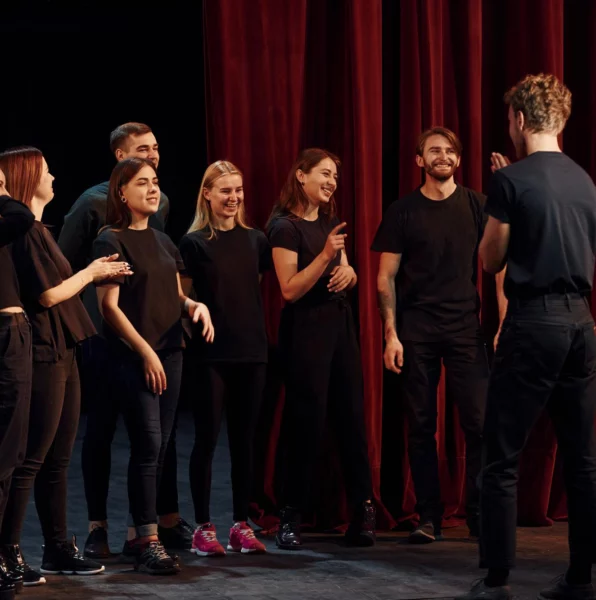How did the role of British science press officers change during the last 20 years? To gather evidence concerning this question the Science Media Centre commissioned a review. Helen Jamison, an independent science communications consultant who was responsible for the report, gives insights into the main results and recommendations.
„We want this project to be the start of a discussion“
What was the purpose of the recently published review called the Changing Role of Science Press Officers (CROSPO)?

One reason was a strategic goal for the Science Media Center. On the occasion of their 20th anniversary this year the founders wanted to reflect on their current and future role. Furthermore, the conversations we had on a regular basis with press officers, researchers, journalists and others who work in the communications field, gave us the general sense that things had changed quite a lot in the field of science communication in the UK. Certainly over the last 20 years but also very rapidly over the last five to ten years. We realized that there wasn’t any evidence outside. So the other purpose was about stepping back and spending some time talking to people and trying to get better insights into some of the developments. We had the idea that this would inform the strategy of the Science Media Center and if there were learnings that could be useful to universities and the rest of the sector we would share them. The review is a snapshot of the field and not an extensive academic analysis. But hopefully it gives us a bit more of an idea of what the field looks like at the moment, how it is changing and what we might do about it in the future.
Which approach did you choose to gather evidence?
We took a mixed approach. The project was split into three parts. The main part were in depth structured Zoom interviews with 41 participants who were working in science communication in the UK. As we started the project, we realized that this is such an enormous field that we needed to focus our efforts on one area. So we decided to focus in this initial phase on the university sector. We interviewed people who worked in universities at a range of levels of experience. They were heads of media, directors of communication, but also vice chancellors and research leaders. To get a range of views, I also talked to people who formerly worked in universities but who had either changed roles or left the sector altogether.
For the second part we did an online survey of press officers in the UK in order to get more details behind the issues we were looking at. We had 116 people who responded to the survey across the UK. 40 of those were based in universities. We also thought it would be important to talk to some researchers and academics at universities to get an idea of how they are working with the press and communications teams. That is why we asked the market research company Ipsos to carry out focus groups with almost 20 researchers who again split across different levels of career and expertise. We can not claim that our results represent everybody, but a lot of the answers we received were quite consistent across the three different methodologies.
One of the results was that the people you talked to perceive a professionalization in the field. What does that mean exactly?
I think a lot of what we found was rather positive. Science communication has really become established as a profession in the UK. Especially the more experienced people told us how in the earlier days there may have been one or two of them doing the job part time. Lots of people responsible for responding to the press or engaging with the public were internal administration staff. But over time universities realized what the critical value of having skilled communication teams brought to them as an organization and also more broadly for the communication of science.
So we are now in a situation where we have a dedicated specialist network of science communicators, press officers and media managers across the UK. Over the years for some of them the resources have increased a lot, which is a good thing. Some of them now have large communication departments and better budgets. But this is not consistent across the country and obviously it depends on the type of university and the financial resources. By and large I would say that most universities now have communication teams and departments. I think press and communications people in the whole field are a lot more valued than they used to be by their senior leaders.
How did the tasks and responsibilities change?
Press officers now have more responsibilities. A lot of them told us how they had gone from a time when the main part of their work wasn to know when the next research paper is coming out and then to get it covered by the media. Now they are involved in a lot more corporate issues of the universities. That is very positive in terms of the establishment of the profession but it has mixed consequences when it comes to doing their job. Many of them need to be present on different channels and to think of various audiences to reach using different channels. They have to be much quicker and more nimble and flexible. In some places it works very well and in other places they find the current demands of the job very challenging and overwhelming.
What role do the institutional changes of universities play?
The introduction of student fees at universities in the UK changed the relation between universities as an institution and the students. Now there is a lot more financial pressure, universities have to focus on recruitment both nationally and internationally. When many of them started, the main audience would have been news journalists. Now they have to think also about prospective students, current students, current staff and parents of students. There are some great examples where the marketing and the communication teams are kept separate but work complementary. In other places the forces were shifted from media relations to recruitment and marketing. This causes a lack of appreciation and frustration for press officers.
The circulation of print media is decreasing whereas social media has become more important. How do the changes in the media landscape affect the work of press officers at universities?
It depends on who you talk to. Particularly for those who are at an earlier stage of their careers there is a sense of this being a good thing because it allows them to diversify their own skill sets. It is not just about talking to journalists and writing press releases, it is about producing content in different formats like podcasts, videos, tweets or texts for websites. Lots of them feel that these channels allow for more creativity and greater control of the messaging.
The flip side to that is that they feel that they are moving away from being real specialists in terms of media relations expertise. Press officers used to really understand what journalists might need and where the pitfalls are. Now some of them feel constantly being pulled in different directions because of the expanse of social media. That is why they can never switch off. They are working in the evenings and during the weekends.
The experienced ones who run media and communications teams realize that they still need specific dedicated media relations skills in their teams. But they find it harder to recruit people with that specialism because of the generalization of the skills. Like all of the developments throughout the report this is a double edged sword. We wanted to highlight not only where the opportunities are but also where the challenges are – so that in future we don’t sleepwalk to a situation where we have lost these skills altogether.
According to your survey 83 percent of the press officers said they had considered leaving their jobs in the last five years. Was this result surprising to you?
To be honest I was surprised by that. When we started the project we knew anecdotally of a few people who considered leaving their posts or the field altogether. But we thought that this might be the exception. I don’t know about Germany but you can’t overemphasize in the UK how much a lot of people love their science communication jobs. It struck me throughout the interviews that everybody I talked to was really passionate about it. At the same time many of them felt undervalued and unsupported. They didn’t feel like they had the resources or the appreciation that they needed within their organizations. That is a real shame.
We already engaged with senior leaders within the universities. Many have said: We didn’t realize that this was happening. Hopefully something we can do is shed a light on that. Not in a negative way but in a way that says: We need to do something about it.
Within 20 years of science communication, the last two were very special. What did you find out about the impact of the pandemic?
Like with everything else that we found there were good bits and bad bits. Most people we interviewed talked constantly about the pandemic, obviously because it was the biggest thing that happened to them both personally and professionally. They generally said that it had accelerated all the changes and experiences, for example the explosion of social media or the political, financial and corporate pressures on their organizations. Everything was faster and busier and with higher pressure.
A lot of them also talked about positive things that happened. In the UK there has been a bounce for public trust in science. And the public really expresses a want and a need for expertise and factual information. So that was a real benefit. The fact that everything became home based and could be done on zoom made experts more open for interviews. I think the flip side is that press officers have been much busier with issues like misinformation, fake news and harassment of their academics. Some researchers felt that when they were under attack, they did not always get the support they needed. Although the science communication community has engaged a lot on the pandemic, in this regard people say that there has been a missed opportunity to act together.
What recommendations do you have for dealing with the different challenges?
In the report we made seven recommendations. We have done it in a very open and hopefully modest way because we want this project to be the start of a discussion. One of the things we want to highlight is that universities should champion the role of press officers in the UK to make sure that the value that they bring is recognized. We don’t expect big changes now that budgets are tight. But for universities it is important that they protect research communication and specifically media relations. Yes, things are changing and print circulations are going down. But at least in the UK news that is on social media is often driven by individuals who are working for traditional media outlets. It’s the big news stories that can still affect the reputation of an organization.
Alongside that it is up to organizations like the SMC to champion the role of specialists and communication officers. Over the years the Science Media Centre underlined the role of scientist journalists and reporters. We now feel the need to apply the same approach to press officers and communications officers whenever there is an opportunity.
Another recommendation is that universities really should to do more about harassment. We think there is a need to form a collective working group on this issue where organizations come together to support researchers.






